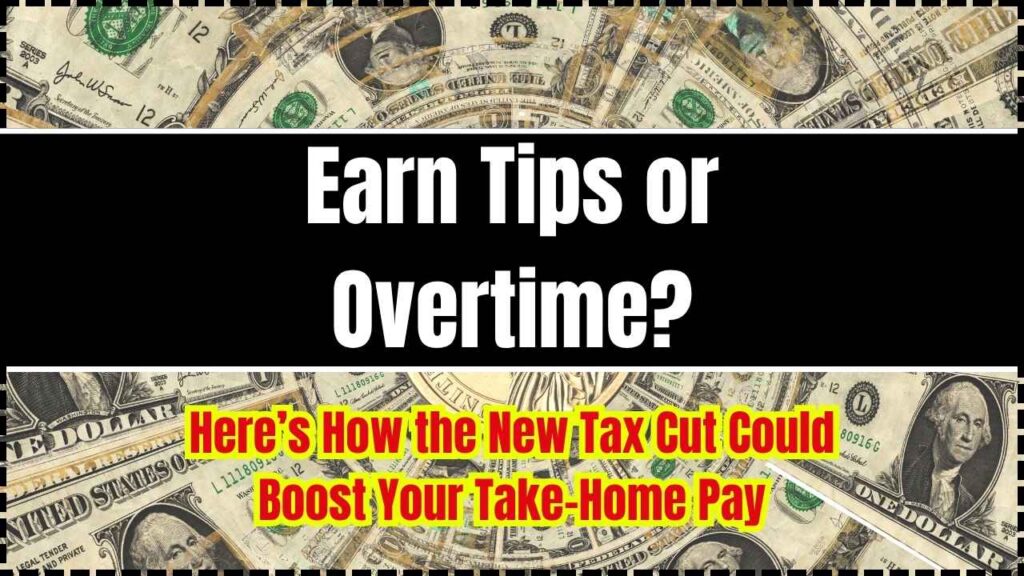Earn Tips or Overtime? If you earn tips waiting tables or regularly clock in overtime hours, you may soon see a bigger paycheck. A new tax proposal aims to make tips and overtime income tax-free at the federal level, possibly starting in 2025. Whether you’re a bartender, warehouse worker, or nurse putting in extra hours, this potential change could seriously boost your wallet.
It’s part of a larger push in Congress to give working-class Americans more breathing room in an economy where living costs are rising faster than wages. Lawmakers say it’s about fairness—letting the folks who hustle the hardest take home more of what they earn. For many, it could mean the difference between just getting by and actually getting ahead. But before you count your tax-free cash, let’s walk through what this means, who qualifies, and how to make sure you don’t miss out.
Earn Tips or Overtime?
This proposed tax exemption could be a game-changer for tipped and hourly workers, offering more breathing room in your paycheck. Whether you’re saving for college, paying down debt, or just trying to keep gas in the car and groceries in the fridge, this is one reform worth keeping an eye on. Of course, it’s not all sunshine and raises. Not every worker will benefit equally, and there are still questions about how this will play out long term.
But if you’re someone who puts in the hours and earns every dollar with sweat and hustle, this could be a well-deserved break. At the end of the day, it’s about getting a little more of what you’ve already earned—and who doesn’t want that? Stay informed, keep your income records tight, and talk to a trusted tax professional when the time comes. A few small steps now could mean a big difference in your wallet next spring.

| Aspect | Details |
|---|---|
| What’s Changing | No federal income tax on tips and overtime pay |
| Who’s Eligible | Workers earning under $160,000/year |
| Tip Income Limit | Up to $25,000 tax-free per year (Senate version) |
| Overtime Deduction | Up to $10,000 (single) or $20,000 (married) |
| Duration | 2025 through 2028 |
| Estimated Savings | $1,675/year (tipped), $1,400–$1,750/year (overtime) |
| Legislation | Part of the “One Big Beautiful Bill” |
| Official Source | Congress.gov |
What’s the Deal With the Tax Cut?
What Is Being Proposed?
This tax reform is part of a sweeping Republican initiative aimed at putting more cash directly into workers’ hands. The plan, dubbed the “One Big Beautiful Bill,” includes two key changes:
- Federal income tax exemption on tips for workers earning less than $160,000.
- Federal income tax deduction for overtime pay, capped at $10,000 for individuals or $20,000 for married couples.
The House and Senate versions differ slightly—one includes an annual cap for tips, the other doesn’t, but both sunset the measure in 2028.

Why It Matters for Tipped and Hourly Workers
Say you’re a server making $18,000 a year in tips. Normally, you’d owe taxes on that income, reducing your refund or increasing what you owe. Under this proposal, if you report your tips accurately, they won’t be taxed at all.
For hourly workers, the overtime angle is a big deal too. A factory employee who pulls 10 extra hours a week might earn an additional $10,000–$15,000 a year. That chunk of income could be tax-free or deductible.
Real-World Example:
Let’s say Lisa, a bartender, makes $22,000 in tips annually. She usually pays about $1,600 in federal income taxes on that amount. If the bill passes, she could keep that money instead. That’s an extra month’s rent or a flight home for the holidays.
Step-by-Step: How to Take Advantage of This Tax Cut If You Earn Tips or Overtime?
If this tax cut becomes law, you don’t want to leave money on the table. Whether you’re pulling overtime shifts or pocketing cash tips after a long night, this step-by-step guide will help you get every dollar you deserve. Here’s how to prepare, qualify, and make the most of it.
Step 1: Track Every Dollar You Earn
You can’t claim what you can’t prove. So start by tracking all tip and overtime income now, even if the law hasn’t passed yet.
How to Do It:
- Use a notebook, spreadsheet, or tip-tracking app like Just the Tips, Gratuity, or Stride.
- Keep a daily log of your cash tips. Note the date, amount, and shift.
- Save your pay stubs that include overtime hours and extra earnings.
- If you’re paid through digital tips (credit cards, apps), make sure those match your reported income.
Pro Tip: Being meticulous now will save you from IRS headaches later—and make it easier to claim deductions or exemptions when it’s time to file.
Step 2: Report Tips to Your Employer (Don’t Skip This!)
Under current law, you’re legally required to report any tip income over $20 per month to your employer. If you don’t, not only is it tax fraud—it also disqualifies you from claiming the proposed exemption.
How to Do It:
- Fill out IRS Form 4070 or report directly via your employer’s payroll system.
- Make sure reported tips show up correctly on your W-2 at the end of the year.
- Keep a copy of each report for your own records.
Why it Matters: Only reported tips are eligible for the federal tax exemption. Unreported tips won’t count and could trigger an audit.
Step 3: Separate Regular Pay from Overtime
Overtime pay needs to be clearly distinguishable from your base pay on your pay stub or payroll records. If it’s all lumped together, it becomes harder to claim the deduction later.
How to Do It:
- Review your paychecks and highlight or tag any hours worked over 40/week.
- Ask HR to separate regular wages from overtime on your pay stubs.
- Save payroll summaries or use free payroll software if you’re self-employed or contracting.
Quick Math: Overtime = 1.5x your hourly rate after 40 hours/week (unless you’re exempt). Make sure the math checks out.
Step 4: Use the Right Tax Tools and Software
Once tax season rolls around, you’ll want to use up-to-date tax software or consult a professional who’s familiar with the latest laws.
Recommended Tools:
- TurboTax Deluxe
- H&R Block Premium
- IRS Free File for lower-income filers
Tax Professional? Even Better.
- Ask if they’re aware of the tip and overtime exemption under the One Big Beautiful Bill.
- Bring your income logs, W-2s, and any proof of overtime to your appointment.
Step 5: Double-Check Your Tax Return Before Filing
You’ve done the work all year—now make sure it shows up correctly when you file.
- Look for a deduction line or exemption box related to overtime or tip income.
- Check your adjusted gross income (AGI) to see if it reflects the exemption.
- Use a checklist: Did you report your tips? Deduct your overtime? Attach the right forms?
Final Tip: Save both a digital and printed copy of your tax return. You’ll need them if the IRS asks questions or the law changes retroactively.
Bonus Step: Plan for the Savings
If you’re suddenly saving $1,500+ a year in taxes, have a plan:
- Start an emergency fund (3–6 months of expenses)
- Pay down high-interest debt
- Put money into a Roth IRA or other retirement plan
- Use it toward professional certifications or job training
Even small financial moves now can set you up for long-term success.
Pros & Cons of the Tax Cut
Pros
- Higher take-home pay
- Encourages accurate income reporting
- More money for daily expenses or savings
- Simpler filing for many workers
Cons
- Limited benefit for very low-income workers who don’t owe taxes anyway
- Potential for employer abuse, like misclassifying wages as tips
- Loss of federal revenue which could affect public services
Expert Perspective
According to a recent analysis by the Tax Policy Center, while millions could benefit, the biggest winners are mid-tier income earners. “This change won’t help the poorest tipped workers—many already don’t pay federal income tax,” says Erica York, Senior Economist at the Tax Foundation.
Still, York notes, “It does encourage better tip reporting and recognizes the demanding nature of overtime work.”
What Critics Are Saying
- Misuse risk: Employers may pressure staff to accept more in tips, reducing hourly wages.
- Revenue gap: According to the Committee for a Responsible Federal Budget, this exemption could reduce federal revenues by $250 billion over a decade.
- Equity concerns: High earners could find loopholes to reclassify income as “overtime.”
GOP Tax Bill Contains a Quiet Threat to Federal Workers; Could This Be the End of the Civil Service?
Senate Republicans Reveal the Quiet Changes They Want in Trump’s ‘Big, Beautiful Bill’
Trump’s ‘Big Beautiful Bill’: Will It Really Eliminate Taxes on Social Security?











